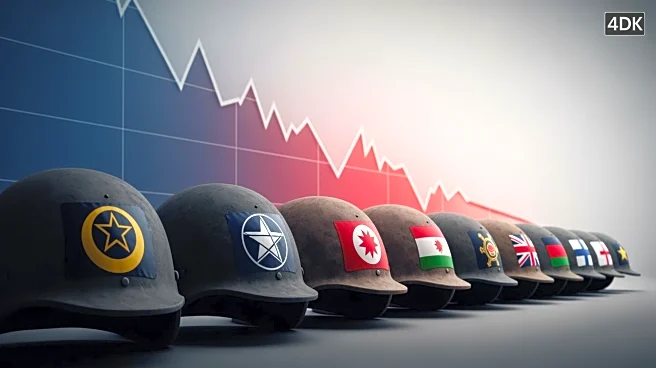What's Happening?
NATO's newest members, Finland and Sweden, have announced plans to purchase more weapons from the United States to support Ukraine, following a significant decline in foreign military aid to the country. Recent data from Germany's Kiel Institute indicates
a 43% drop in aid during July and August compared to the first half of the year. Despite the Prioritized Ukraine Requirements List (PURL) program, which coordinates regular deliveries of military support, the decrease in aid has raised concerns among NATO members. Finland and Sweden are joining efforts to bolster Ukraine's defense capabilities, with Finland also providing its own military equipment. Sweden's Defense Minister, Pål Jonson, emphasized the need for increased support, while Estonian Defense Minister Hanno Pevkur noted the reduced share of U.S. contributions this year.
Why It's Important?
The decline in Western military aid to Ukraine has significant implications for the ongoing conflict with Russia. As European arsenals deplete, the reliance on U.S. arms becomes crucial for Ukraine's defense strategy. The decision by Finland and Sweden to increase arms purchases highlights the urgency of maintaining support for Ukraine amidst dwindling resources. This shift may influence NATO's overall strategy and pressure other member countries to contribute more significantly. The situation underscores the geopolitical dynamics within NATO and the importance of collective defense efforts in addressing regional security threats.
What's Next?
NATO members are expected to continue discussions on increasing military support for Ukraine. The U.S. Defense Secretary has expressed expectations for more countries to donate and purchase weapons to aid Ukraine. The Trump administration is considering sending Tomahawk missiles if Russia does not de-escalate the conflict, although funding for these weapons remains uncertain. The ongoing debate within NATO about equitable burden-sharing and financial contributions will likely persist, with calls for all members to meet defense spending targets. The situation may prompt further diplomatic negotiations and strategic adjustments within the alliance.
Beyond the Headlines
The decline in Western support for Ukraine raises ethical and strategic questions about international commitments to conflict resolution and defense. The financial constraints faced by countries like France, Italy, and Spain highlight broader economic challenges impacting defense spending. The emphasis on purchasing U.S. arms may also affect Europe's defense industry, sparking debates about the allocation of resources and the balance between national and collective security interests. These dynamics could lead to long-term shifts in NATO's operational priorities and influence future defense policies.















